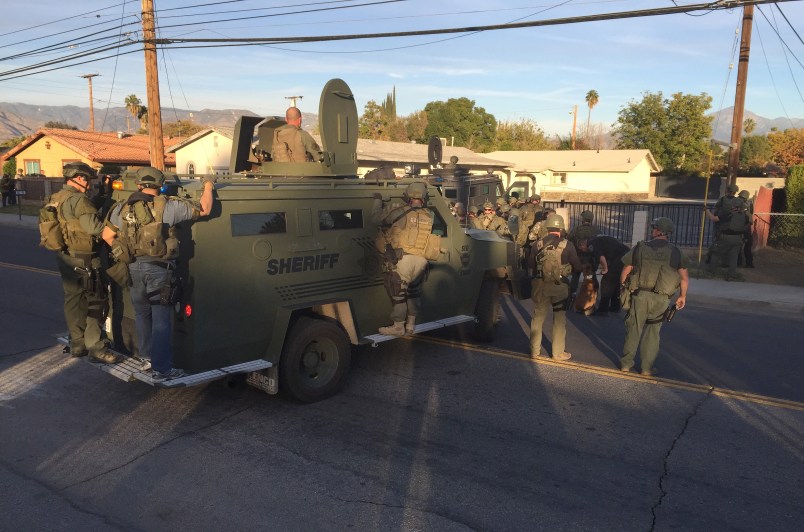As you likely are too, I’m watching conversations unfold among friends on Facebook and in real life about the terrorist attack in San Bernardino and what the United States should be doing in response. Depending on your point of view, the argument is framed as one between American values and bigotry or political correctness and getting tough on radical Islam. Admittedly, these are extreme formulations, in each case using one side’s caricature of the other. But all of this ignores the central conundrum we face when we think about counter-terrorism, especially ones of the lone wolf variety or even more organized ones like the recent massacre in Paris.
The kinds of surveillance and scrutiny which inevitably fall on suspect populations as part of a heightened counter-terrorism posture are exactly the kinds of strictures which over time are likely to create the kind of social isolation and alienation which seems, from the evidence we have from Europe, to create a breeding ground for radicalization. So getting the balance right is very difficult. And this is entirely apart from the very legitimate and pressing discussion about what policies are American values and our constitution will or should allow. Throw all of that out the window and you’ve still got a very complex balancing act on your hands.

July 7, 2005 London transit system attack. 52 civilians killed, more than 700 wounded.
Let’s take the case of Western Europe. Over a couple decades and particularly since 9/11 we’ve had abundant evidence that Muslims in Europe, and particularly Muslims whose ancestry is in Muslim majority countries in the Middles East, North Africa and South Asia appear to be substantially more prone to radicalization and participation is mass casualty terror attacks than immigrants and descendants of immigrants from those countries now living in the United States. We have lots of evidence for this both in journalistic and academic studies. And we have lots of evidence in a volume of terrorist attacks. The 9/11 attacks stand alone in terms of death count. But the Paris attacks, ghastly as they were, come after London, Madrid, Charlie Hebdo, various individual attacks, assassinations, one-off attacks on Jews in France, Belgium, the Netherlands and other countries in Western Europe. Virtually everyone who has studied the matter concludes that it is this social isolation that is at the root of the greater propensity toward radicalization and willingness, albeit for a tiny subsection of the population, to commit acts of violence.
Now, this isn’t only a matter of prejudice or Islamophobia. And it’s certainly not just a response to counter-terrorism surveillance since the phenomena long predates all the post-2001 measures. One key issue is that Western European countries simply have much less historical experience with mass immigration or the mix of ethnic diversity and assimilation that it brings with it and requires. Another too little discussed issue is that the great majority of these immigrants in France and the United Kingdom are immigrants from or descendants of immigrants from countries which France and the UK once ruled as colonies. In the case of France, remember that many of the assailants in recent terror attacks are the descendants of Algerian immigrants. And Algeria was for decades not a colony, at least technically speaking, but an integral part of the French Republic – Oran was just as much part of France as Marseilles, but with the vast majority of Muslims lacking full civil and political rights. That is a whole other issue. And it’s beyond the scope of this post to address. But I think it must play some role in the way Middle Eastern and North African immigrants in France for instance remain a people apart in a way that seems profoundly different from in the United States.
What does it all mean?
It means that one of our key strategic defenses against the general conflagration of the Middle East and Muslim South Asia spilling over onto the mainland United States is and has been the relatively high level of integration of American Muslims. Talk to any counterterrorism expert in law enforcement, the US intelligence community or academics and they will tell you this is true. Not nutballs on Fox News or other more mainstream outlets – but people actually charged with keeping Americans safe. The best way to change that is to turn American Muslims into a suspect population, walled off from the mainstream of American life by fear, bigotry and even well-intentioned broad and aggressive surveillance.
I don’t say this as just some big pluralism Kumbaya. This is a real threat. And the fact that we also have far-right, revanchist white extremists and overlapping anti-abortion extremists in the US doesn’t make it less of a threat. I also want to be clear that I’m not brushing aside the constitutional strictures and American values of pluralism. My point is that even if we did do that, even if we collectively said, ‘okay enough, it’s too dangerous not to finally crack down’ and do all the stuff the Islamophobes want we’d likely be sowing more trouble. We’d end up like France. As I noted just after the Paris attacks, we need to realize that while Assad is a big problem, he’s not something or someone that poses any pressing and immediate threat to the US. ISIS is that kind of threat. And we need to order our Syria policy around eliminating that threat. That’s important and necessary. And yet, our real objective needs to be not so much withdrawing from the Middle East as cauterizing ourselves off from the societal collapse which is engulfing it.

On all these fronts we face something like a a Chinese finger puzzle: the things we do to arrest the problem draw us deeper into it, paradoxically deepen the threats facing us. The conundrum requires a mix of force and restraint, vigilance and pluralism. It is genuinely complicated and a balance our politics – any democratic society’s politics – is challenged to summon.






